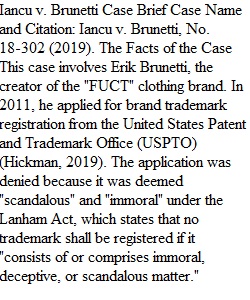


Q Instructions 1. Complete your readings. 2. Brief Iancu v. Brunetti, a Supreme Court case attached to this assignment. Please don't submit a case brief longer than three pages. Use the same format you used for last week's assignment. Remember that case briefs are used to highlight the key information contained within a case for use within the legal community as court cases can be quite lengthy. When writing case briefs, please cite properly. Make sure you are not copying and pasting from your source. While a case brief requires you to identify the parts of a case, you should not solely cut and paste from the case. Remember that Turnitin.com reviews all papers; a similarity score of more than 10% may raise red flags. Note: The purpose of case briefing is to highlight and summarize key information, merely copying and pasting from the case does not accomplish this goal. You must summarize the facts in your own words, using quotations sparingly. And, please do not submit a paper that you found on the internet as your own. Remember to proofread your work! Additionally, don't forget to submit it as a .doc or .docx document as you submit it for grading. Before submitting your second case brief, please make sure that you review my comments on your practice brief. Don't hesitate to contact me if you run into problems with this assignment. And remember - don't make it more complicated than it needs to be. Additionally - good writing is good writing, whether you are writing a case brief or a research paper. Don't forget what you already know about writing.
View Related Questions